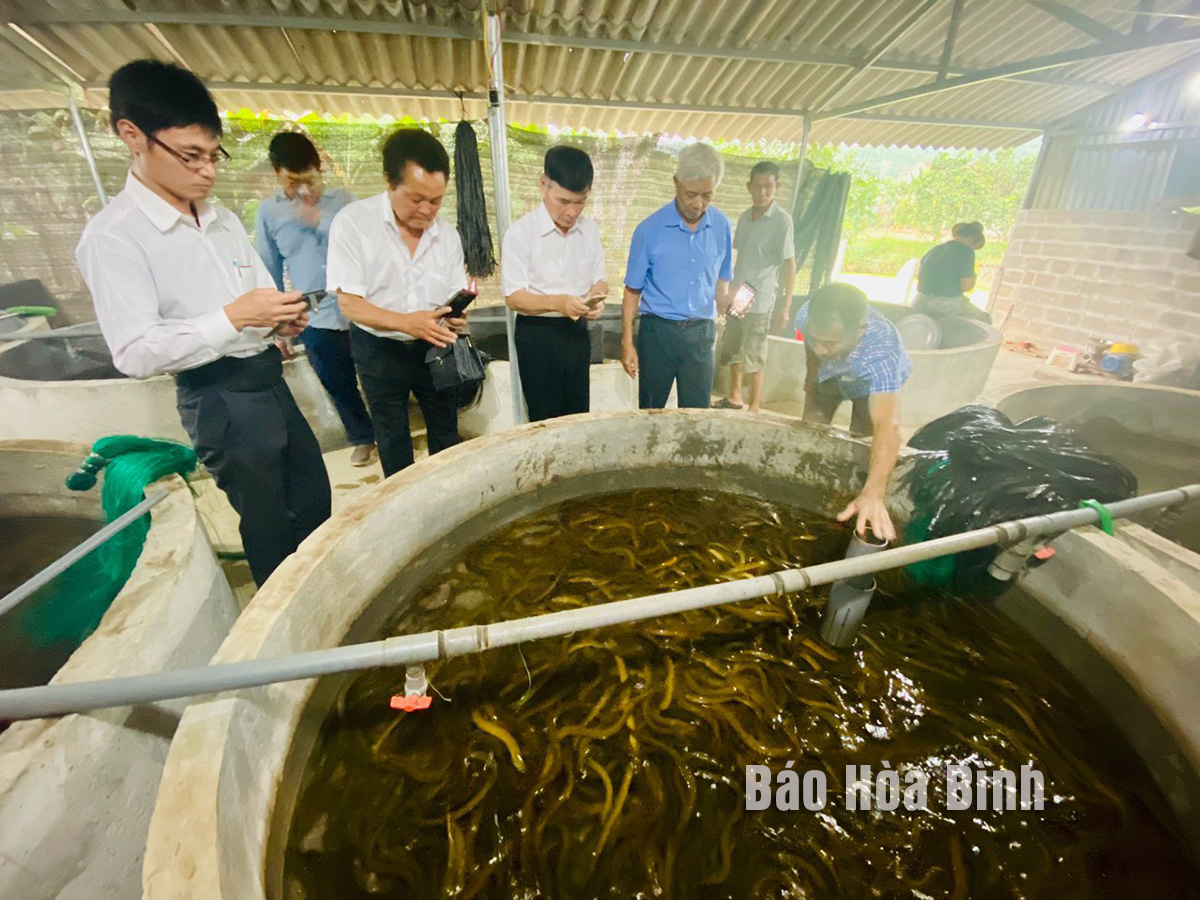
Doan Ket, a remote commune of Yen Thuy district, has more than 98% of its population being people from ethnic minority groups, mainly Muong. Over the past years, local residents have upheld the tradition of solidarity as well as their trust in the leadership of the local Party committee and administration to make joint efforts to develop their hometown and meet new-style countryside criteria.
Commercial eel farming has helped residents in Men
Lien Ket hamlet of Doan Ket commune, Yen Thuy district, secure a livelihood
with stable income.
Among outstanding moves to care for people’s
material and spiritual lives over the past years, Doan Ket has optimised
capital sources and effectively carried out projects to help people develop
livelihoods, improve the capacity of grassroots civil servants, and build
infrastructure to give a facelift to this ethnic minority area.
Chairman of the communal People’s Committee Bui
Van Duc said that considering the construction of infrastructure, especially
transport facilities, as important to making development breakthroughs, Doan
Ket has mobilised resources from the national target programmes to build and
upgrade roads connecting local hamlets and linking it with other communes and
arteries of Yen Thuy district.
As of the end of 2023, the commune concretised
over 12km of rural roads, creating a favourable condition for meeting advanced
new-style countryside criteria.
In addition, he noted, Doan Ket has also
invested efforts in addressing water supply-related problems since many local
hamlets often struggle with clean water shortages in the dry season. Thanks to
funding from the national target programme on socio-economic development in
ethnic minority and mountainous areas, the commune has provided disadvantaged
households with 53 stainless-steel tanks, each of which can contain 1,200
litres of water.
Making use of other sources of financial aid,
people have built, upgraded, and repaired three houses of culture for hamlets,
thus meeting people’s demand for community activities.
Besides, Duc went on, Doan Ket has boosted
giving guidance to people on how to develop effective livelihood models based
on local potential and advantages. It has coordinated with divisions of Yen
Thuy district to hold training courses to improve public awareness and transfer
scientific - technological advances to locals, especially young people.
Authorities have also facilitated households’
access to preferential loans for socio-economic development, encouraged people
to switch to farming the crops and animals that suit local natural conditions
and meet market demand, and helped them partner with businesses to engage in
production chains, the official added.
As a result, one cooperative was established in
Doan Ket, and it is cooperating with T9 Co. Ltd to form a 6ha chilli
cultivation zone, generating stable income for many households. Basing on an
initial cooperative model, locals set up the Thanh Cong Agricultural Production
and Services Co. Ltd, which specialises in eel farming and processing. The
commune has also successfully developed two products rated three stars under
the One Commune, One Product (OCOP) programme, namely the Doan Ket honey and
the processed eel.
Thanks to those efforts, Doan Ket has enjoyed
considerable socio-economic improvements. In 2023, per capita income averaged
55 million VND (over 2,200 USD) while the household poverty rate was brought
down to 3.09%. The material and spiritual lives of the majority of ethnic
minority people have also been bettered.
The support from all-level authorities and
sectors has contributed to the reinforcement of ethnic minorities’ trust in the
Party and administration’s leadership, helping Doan Ket establish itself as a
new-style rural commune and more forwards to achieve advanced new-style
countryside criteria, according to Chairman Duc.
Hoa Binh province is undergoing a dynamic transformation amid Vietnam’s national digital transition. Building on Poliburo’s Resolution No. 57-NQ/TW on breakthroughs in science, technology, innovation, and national digital transformation, the province has rolled out a wide range of practical action plans. A standout initiative is the "Digital Literacy for All” movement, an effort to ensure that no one is left behind in the digital era.
Hoa Binh province is undergoing a dynamic transformation in the wake of the national digital transformation movement. Building on Resolution No. 57-NQ/TW of the Politburo on breakthroughs in science, technology, innovation, and national digital transformation, the province has implemented a wide range of practical action plans. A standout initiative is the "Digital Literacy for All” movement ambitious effort to ensure that no one is left behind in the digital age.
With a spirit of unity and proactive problem-solving, the Party Committee, the government and the people of Dong Lai Commune (Tan Lac District) have made great strides in implementing the resolutions of the 24th Party Congress of the commune for the 2020 - 2025 term. Focusing on leadership and practical actions, the commune has brought the Party’s resolutions into daily life, creating strong impacts and pushing the local development forward.
Amid the nationwide push for digital transformation, young people in Hoa Binh Province are stepping up as dynamic pioneers, applying technology to enhance Youth Union operations and expand the reach of youth-led initiatives. Through creativity and adaptability, Youth Union organizations at all levels have introduced a series of practical solutions, contributing to modern governance and community development.
In recent years, An Nghia commune, located in Lac Son district, has stepped up administrative reform, focusing on improving the quality and efficiency of its single-window service unit for receiving and processing administrative procedures. These improvements have helped create favourable conditions for local residents and organisations to handle administrative procedures, contributing to the commune’s broader socio-economic development.
The Prime Minister-approved master plan to develop the multi-use value of forests ecosystems through 2030, with a vision to 2050, aims to improve the management and sustainable use of forest resources, create jobs, increase incomes, and improve the living standards of ethnic minorities, people in mountainous and remote areas, forest workers and those living near forests.



